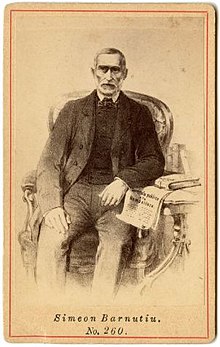Simion Bărnuțiu
Simion Bărnuțiu (born July 21, 1808 in Bocşa , Transylvania ; † May 28, 1864 in Sânmihaiu Almaşului , Transylvania) was a Romanian philosopher, liberal politician, lawyer and historian.
biography
Simion Bărnuțiu grew up in a Greek Catholic family in Transylvania. His father, Ioan Bărnuțiu, was a teacher and his mother, Ana Oros, was the daughter of a Greek Catholic priest. At that time, Transylvania was part of the Austrian Empire .
Between 1826 and 1829 he studied theology in Blaj and became a Greek Catholic priest. He did not aspire to a church career, but became a teacher of philosophy and history in Blaj. In 1845 he finally had to leave Blaj due to a dispute with the Greek Catholic Bishop Ioan Lemeni. Bărnuțiu then studied law in Sibiu until 1848 . Then he got involved in the revolution of 1848/49 for the rights of the Romanians.
Due to the suppression of the uprisings, Bărnuțiu first had to leave Sibiu and Transylvania. Between 1850 and 1854 he studied law at the Universities of Vienna and Pavia . In 1854 he went to Iași in the Principality of Moldova . He received a professorship at the Academia Mihăileană (1855-1860) and then at the University of Iași (1860-1864). Here, too, his ideas of freedom and nation left a lasting impression on colleagues and students.
When he became seriously ill towards the end of his life, he decided to return to his hometown of Bocșa in Transylvania. He died on the way in a railroad car, so his place of death is also controversial.
effect
Under the strong influence of the philosophy of Immanuel Kant , Bărnuțiu saw in philosophy an instrument with which - if used correctly - one could change society. He saw the task of philosophy in developing the mind on the one hand and analyzing human nature on the other hand with the aim of showing people how they should be. He believes that every individual should have the right to live and work freely and to develop intellectually and morally in order to increase personal happiness and prosperity.
Simion Bărnuțiu was one of the organizers and leaders of the 1848 revolutionary movement in Transylvania. He was a participant in the national assembly of Blaj in April and May 1848. In a manifest of March 24, 1848 he warned against a swift union with Hungary, because he was the assimilation of the Romanians, i. H. especially feared the suppression of the Romanian language.
Influenced by the philosophy of Kant and Johann Gottfried Herder , he developed the axiom of the natural rights of self-realization of the individual and applied it to nation, culture and language. On this basis he demanded the right of self-determination for the Romanians in Transylvania. He campaigned for the multinational state as an alternative to the unified Hungarian nation state.
literature
- G. Bogdan-Duica: Viața și ideile lui Simion Bărnuțiu . Bucharest, 1924.
- Petre Pandrea: Filosofia politico-juridică a lui Simion Bărnuțiu . Bucharest, 1935.
- Radu Pantazi: Simion Bărnuțiu. Opera și gîndirea. Bucharest, 1967.
- George Em Marica. Studii şi de istorie sociologia culturii române ardelene din Secolul al XIX-lea I . Cluj-Napoca, 1977.
Individual evidence
- ↑ ohiou.edu: Simeon Barnutiu (1808-1864) ( Memento of the original from September 9, 2006 in the Internet Archive ) Info: The archive link was inserted automatically and has not yet been checked. Please check the original and archive link according to the instructions and then remove this notice. (Accessed August 16, 2008)
- ^ History of Transylvania Béla Köpeczi (ed.): Brief history of Transylvania . (Accessed August 16, 2008)
Web links
- History of Transylvania Béla Köpeczi (Hrsg.): A short history of Transylvania . Institute of History of the Hungarian Academy of Sciences
- Simion Bărnuţiu (1808–1864) , by Keith Hitchins and Apostol Stan, September 3, 2004, from the Encyclopedia of 1848 Revolutions (Eng.)
| personal data | |
|---|---|
| SURNAME | Bărnuțiu, Simion |
| BRIEF DESCRIPTION | Romanian philosopher, liberal politician, lawyer and historian |
| DATE OF BIRTH | July 21, 1808 |
| PLACE OF BIRTH | Bocșa , Transylvania |
| DATE OF DEATH | May 28, 1864 |
| Place of death | Sânmihaiu Almașului , Transylvania |

